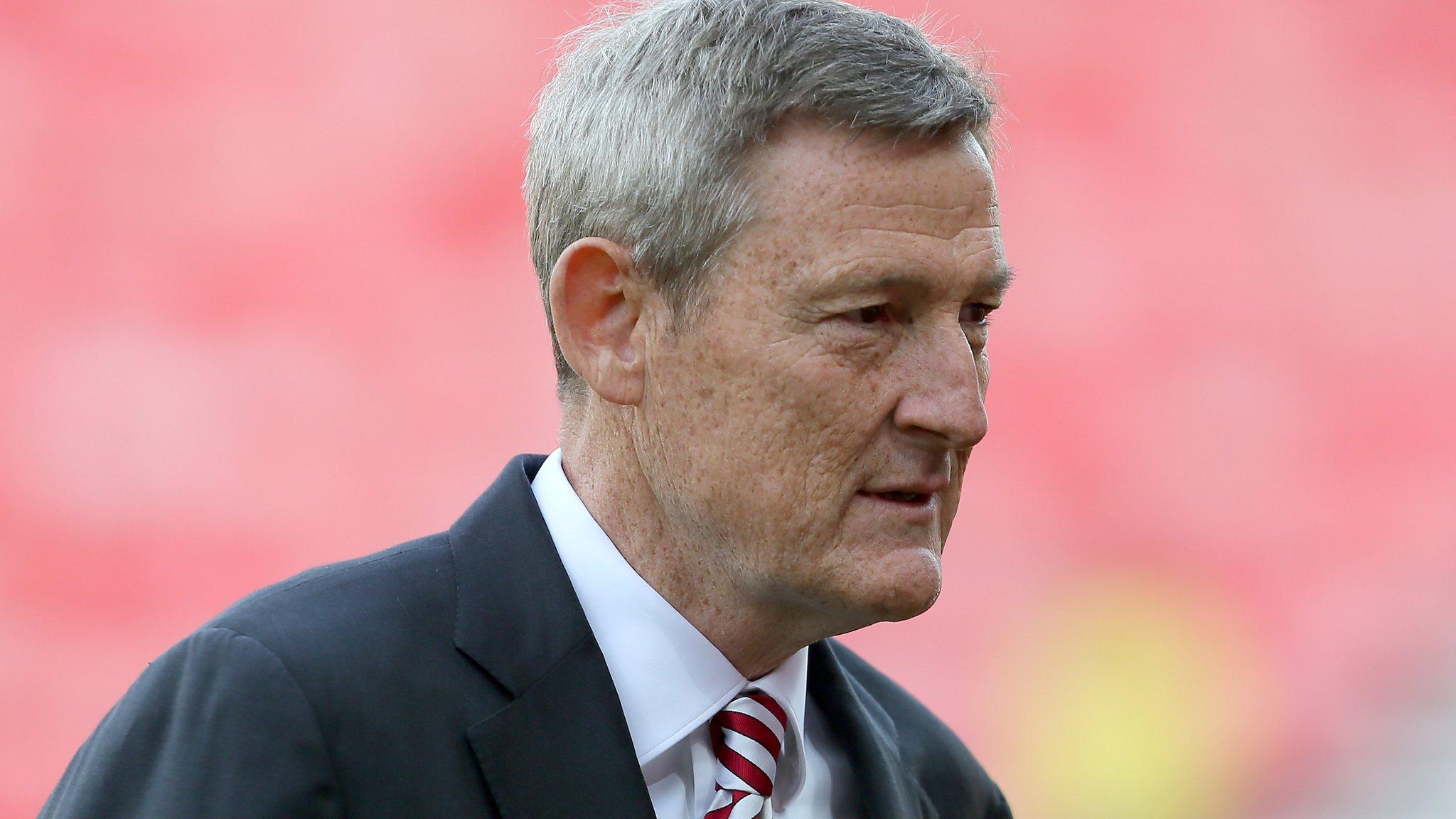Ellis Short: Outgoing Sunderland owner gives club 'clean sheet' - his tenure in numbers
- Published
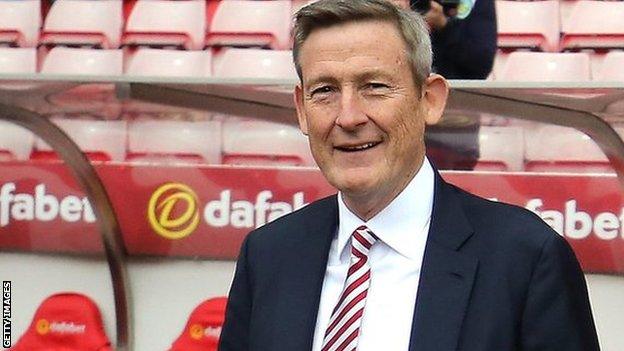
Ellis Short took full control of Sunderland at the end of the 2008-09 season
By writing off the club's debts, outgoing chairman Ellis Short has given Sunderland's new owners "a clean sheet", says University of Liverpool football finance expert Kieran Maguire.
A consortium led by Eastleigh's Stewart Donald will take over the club, subject to English Football League approval.
After successive relegations, the Black Cats will play in the third tier for the first time in 30 years next season.
"Sunderland should be very successful in League One," Maguire said.
"It's a completely different financial environment to operate in. Half of the clubs in League One didn't pay any money at all for transfer fees last season.
"So, with Sunderland's Premier League parachute payments, there is actually the opportunity in League One to probably regroup in a better way than in the Championship itself.
"The debts were £140m. They were paying £130,000 a week in interest on bank loans to an American company. So, if Ellis Short has taken over that loan, then fair play to him."
Maguire described Short's nine-year reign as a "car crash", but will the American businessman's parting financial gift to the Black Cats prove to be his most important contribution?
BBC Sport looks into Short's tenure at the Stadium of Light in numbers, reflecting on nine seasons which included as many different managers as victories in FA Cup games.
Nine seasons, nine managers
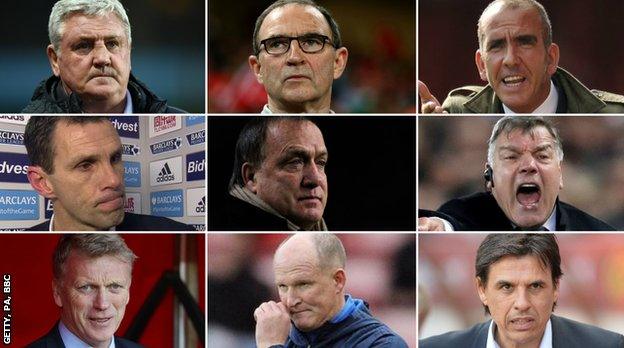
Ellis Short hired three overseas bosses for Sunderland, plus six British managers
Since June 2009, Steve Bruce, Martin O'Neill, Paolo Di Canio, Gus Poyet, Dick Advocaat, Sam Allardyce, David Moyes, Simon Grayson and Chris Coleman have all taken charge of Short's Sunderland.
Of the nine bosses, Northern Irishman O'Neill enjoyed the best win percentage, overseeing victories in 31.8% of his matches in charge of the Black Cats.
Coleman was appointed in November after Grayson's departure, inheriting a side at the bottom of the Championship with just one win.
But the former Wales national team boss was unable to steer the club away from the relegation zone, with a dramatic 2-1 loss at home to Burton on 21 April confirming their second straight relegation.
One League Cup final

Sunderland beat Manchester United on penalties in the semi-finals of the 2013-14 League Cup
Short's tenure did include the club's first Wembley cup final since 1992, as Poyet led his side to the final of the 2013-14 Capital One Cup.
But a 3-1 defeat by Manchester City in the final left the Black Cats still waiting for their first major trophy since lifting the 1973 FA Cup.
Meanwhile, in the FA Cup, Sunderland won just nine games since 2009, being knocked out as early as the third round on five occasions.
Four great escapes
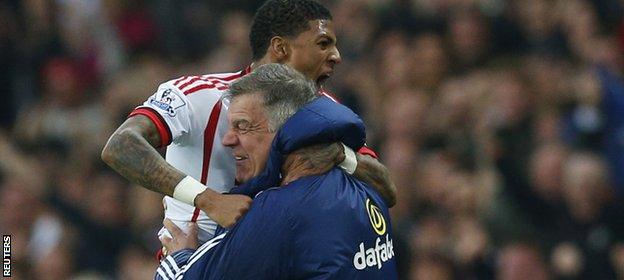
Sunderland were in the relegation zone for 237 days in the 2016-17 season, but survived
Prior to their relegation from the Premier League in 2017, Sunderland spent seven other seasons under Short's ownership playing Premier League football.
The American took full control of the club shortly after their narrow escape from relegation in 2008-09, which saw rivals Newcastle and Middlesbrough both drop down to the Championship.
And the next three seasons saw the club enjoy relative stability, finishing towards mid-table, but then four separate escape acts were required to avoid relegation.
Di Canio, Poyet, Advocaat and Allardyce all steered the club away from relegations after arriving midway through separate, consecutive seasons, between 2012-13 and 2015-16.
Two relegations
Across those seven seasons in which Sunderland secured Premier League safety, they finished, on average, just 6.1 points and four places clear of the relegation zone.
What is more, they only surpassed the fabled 40-point mark in three of those seven campaigns.
However, after Allardyce left to take the England job in 2016, Sunderland were unable to avoid the drop the following season.
Just six league wins under former Manchester United and Everton boss Moyes followed in 2016-17, as the Black Cats finished bottom of the table, a hefty 16 points adrift of safety.
This term, neither Grayson and Coleman could arrest the club's downward slide, as they dropped towards the third tier for the first time since 1987-88.
48 home league wins
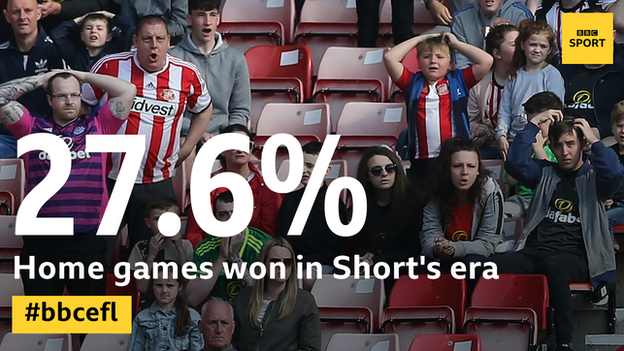
Sunderland won just over a quarter of their 174 home league matches in Ellis Short's era
If you are a Sunderland fan and have been to every league game at the Stadium of Light in the past nine seasons, you have not left many of those matches feeling particularly joyous.
That's because, in the 174 home league games that the club played during Short's tenure, just 48 resulted in wins.
The Black Cats also failed to recruit many potent strikers while Short was at the club, with only Darren Bent - with his 25 goals in the 2009-10 season - surpassing 15 goals in a season.
15,000 missing fans
During the Premier League years, Sunderland would pack out the 49,000 seats at the Stadium of Light in derbies against Newcastle United or in hosting Liverpool, Arsenal or Manchester United.
Those crowds have tumbled in the Championship, although they remain the fourth best-supported side in the second tier with an average of 27,597.
Only champions Wolves, Leeds United and Aston Villa have better averages, while Sunderland's cumulative Championship crowd of 607,153 with one home game to play is more than three times that of League One leaders Wigan Athletic.
But the 2017-18 season average home attendance is set to be some 15,000 fewer than at the peak of Short's tenure.
Six wins over Newcastle
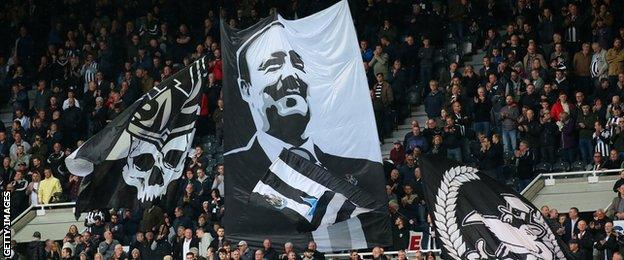
Newcastle United only won at the Stadium of Light once during the Ellis Short era
Despite Sunderland's recent downward spiral, their fans have still enjoyed some local bragging rights of sorts, being unbeaten in the Tyne-Wear derby since 2011.
In the Short era, Sunderland enjoyed six wins from 12 games against rivals Newcastle, losing just twice.
And three of the Black Cats' recent derby victories came by a 3-0 scoreline.
£500,000 lost per week?
University of Liverpool football finance expert Kieran Maguire on BBC Newcastle:
Sunderland has been a bit of a car crash since Ellis Short took over.
They've effectively lost £500,000 every week since he acquired the club and I think he was fed up of having the write that cheque each Monday morning to keep the club going.
If you can clear the decks in terms of the bad apples in the squad, then given the parachute payments that are coming in, that does give you the basis to come straight back.
Wolverhampton Wanderers were relegated twice in a row five years ago, then they went straight back to the Championship and now have actually gone and won the Championship.
So there is actually the opportunity in League One to probably regroup in a better way than in the Championship itself.
That [the Championship] is a car crash of a division if you've not got the right finances in place.
So, while it's an extra year out, in terms of getting back to the top tier, it does allow the manager and the new owners a little bit of breathing space, to cope with this division.
They'll come straight back, that's almost certain, and then they're in a better position because they'll have managed to release all they players they don't need and then go forward from there.
Nine years of perceived stony silences?
Analysis: BBC Newcastle's Sunderland commentator, Nick Barnes
Ellis Short was not one for media interviews but, that said, it was more from his lack of confidence in front of a microphone or camera than his reticence to communicate.
He would happily answer questions by email after he left the club, and when he was present in his early years at the helm would happily spend time talking to me about all aspects of the club.
The American billionaire's tenure at Sunderland will in hindsight be viewed with mixed emotions by Sunderland fans.
Applauded for his initial investment in the club, he was subsequently demonised when he lost interest in the club and sought a way out.
Short pumped more than £200m into Sunderland over the 10 years he was in charge and even to the end of his time was feeding its voracious appetite for cash with payments mounting to almost £20m a year just to keep the club running.
However, fans turned against him when he effectively became an absentee landlord and refused to inject any more money into the playing side after the departure of David Moyes.
Short admits to the mistakes he made which directly led to many of the club's problems and fans saw his absenteeism as a sign of negligence and of not caring.
Those feelings were compounded with a refusal to spend any money on players in the transfer window in January this year when most fans saw that window as the opportunity to stave off relegation.
But in agreeing to wipe the club's debts and restore Sunderland to a sound financial footing, the fans may now re-evaluate their opinions of the former owner.
One former manager's view
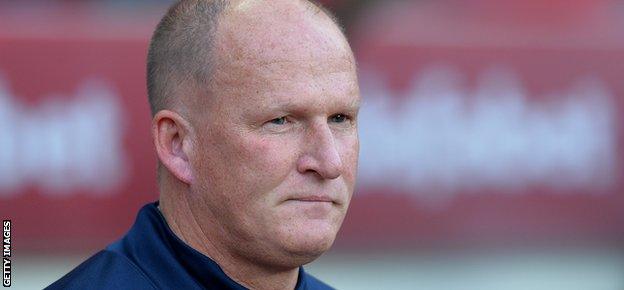
Simon Grayson, now in charge at Bradford City, was sacked by Sunderland last October after 18 games in charge
Former Sunderland boss Simon Grayson, speaking to BBC Radio 5 live
It's very difficult to solely put the blame on him because he's invested something like £200m into a football club and anybody who invests that sort of money has a real affinity with a club.
But it's the last two or three years where he has wanted to sell the club and not put the money in.
Even this year we brought in £50m worth of transfer sales and replaced it with 12 players for £1m and that's been a knock-on effect we have all had to deal with.
So he's lost the love of the football club, love of football and obviously decided the time is right to sell and get somebody new to start again.
- Published29 April 2018
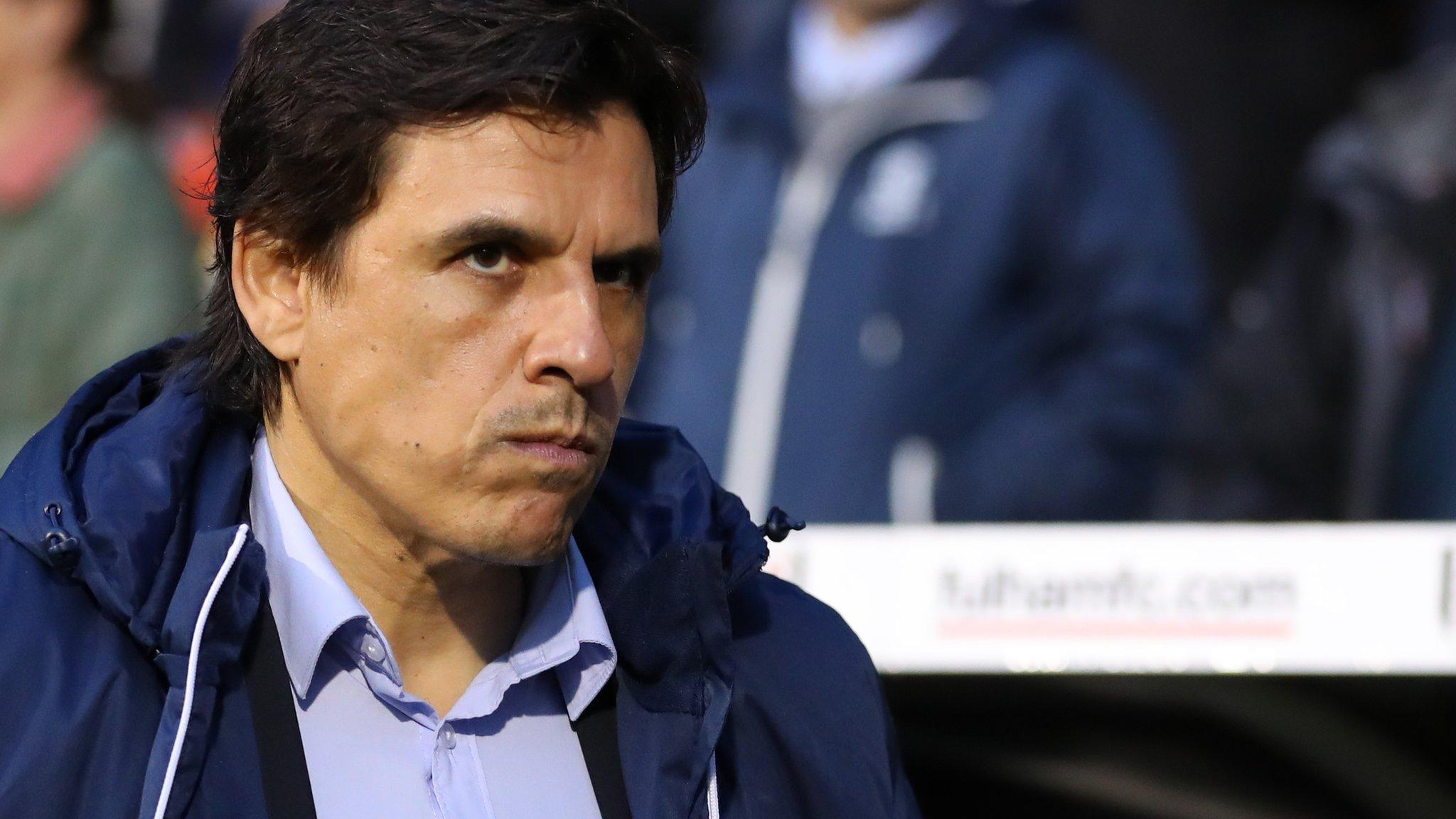
- Published22 April 2018

- Published22 February 2018
